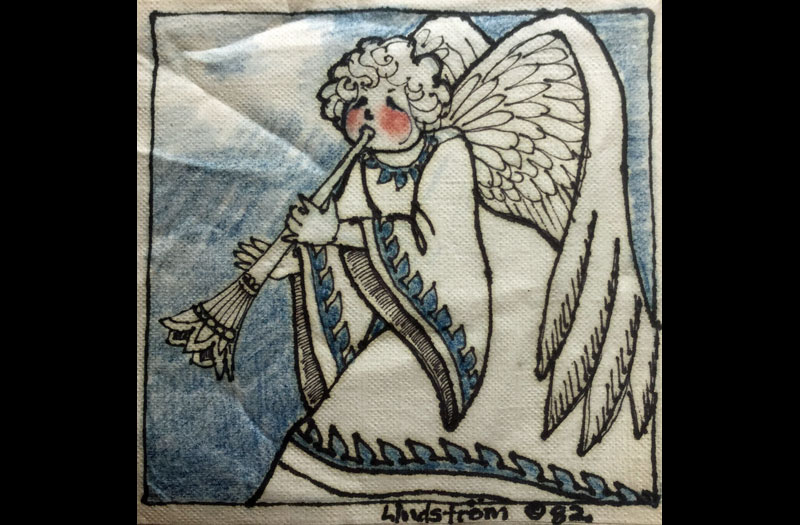I woke up this morning in a fright, woke up from a long dream in which I imagined I was a computer simulation. And now, and now I’m not sure if I’m dreaming this that I’m writing and if the dream was reality or the other way around.
I’m not crazy. Please do not think so. According to Joshua Rothman, in his recent article in The New Yorker: What Are The Odds We Are Living in a Computer Simulation, many people far smarter than I have pondered this very matter with equal angst ending in the same forest of confusion where I found myself lost this morning.
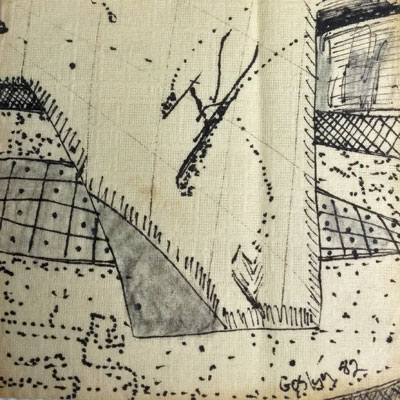
Sea Gull Cellar Bar, Napkin Art, Goslyn artist
Thinking deeply about this as I have, it is now apparent that the seeds of my dilemma were planted long ago. For instance, I remember the stirrings of such thoughts when, as a young man, I first heard that Napoleon asked the famous scholar Laplace about God. It is said that Laplace responded with “I have no need of that hypothesis.” Apparently Laplace did not intend to say that God did not exist, only that God did not randomly interfere in the workings of the universe, workings that proceed like clockwork from initial conditions according to the laws of science. Given that I myself was such a “working,” it occurred to me that I might be some kind of automaton programmed by a scientist in a higher civilization.
Later, reveling in my throw over of religion for atheism, my suspicions of being a simulation were further strengthened while reading Bertrand Russell’s A Free Man’s Worship.
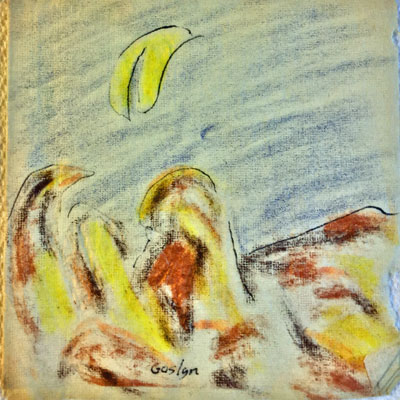
Sea Gull Cellar Bar, Napkin Art, Artist Goslyn
To Dr. Faustus in his study Mephistopheles told the history of the Creation, saying:
“The endless praises of the choirs of angels had begun to grow wearisome; for, after all, did he not deserve their praise? Had he not given them endless joy? Would it not be more amusing to obtain undeserved praise, to be worshipped by beings whom he tortured? He smiled inwardly, and resolved that the great drama should be performed.
“For countless ages the hot nebula whirled aimlessly through space. At length it began to take shape, the central mass threw off planets, the planets cooled, boiling seas and burning mountains heaved and tossed, from black masses of cloud hot sheets of rain deluged the barely solid crust. And now the first germ of life grew in the depths of the ocean, and developed rapidly in the fructifying warmth into vast forest trees, huge ferns springing from the damp mould, sea monsters breeding, fighting, devouring, and passing away. And from the monsters, as the play unfolded itself, Man was born, with the power of thought, the knowledge of good and evil, and the cruel thirst for worship. And Man saw that all is passing in this mad, monstrous world, that all is struggling to snatch, at any cost, a few brief moments of life before Death’s inexorable decree. And Man said: `There is a hidden purpose, could we but fathom it, and the purpose is good; for we must reverence something, and in the visible world there is nothing worthy of reverence.’ And Man stood aside from the struggle, resolving that God intended harmony to come out of chaos by human efforts. And when he followed the instincts which God had transmitted to him from his ancestry of beasts of prey, he called it Sin, and asked God to forgive him. But he doubted whether he could be justly forgiven, until he invented a divine Plan by which God’s wrath was to have been appeased. And seeing the present was bad, he made it yet worse, that thereby the future might be better. And he gave God thanks for the strength that enabled him to forgo even the joys that were possible. And God smiled; and when he saw that Man had become perfect in renunciation and worship, he sent another sun through the sky, which crashed into Man’s sun; and all returned again to nebula.
“`Yes,’ he murmured, `it was a good play; I will have it performed again.'”
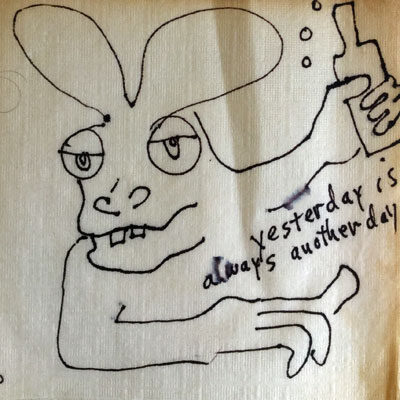
Sea Gull Cellar Bar, Napkin Art, Artist SP
The journey continues and always I seem to return to the same conclusion with slight modifications. The author Miguel de Unamuno wrote a short little tragic comedy called Nebbia or Mist in which the principal character, Augusto, in an existential crisis and contemplating suicide, confronts the author, Unamuno (Don Miguel).
“The truth is, my dear Augusto”, I spoke to him the softest of tones, “you can’t kill yourself because you are not alive; and you are not alive—or dead either—because you do not exist.”
“I don’t exist! What do you mean by that?”
“No, you do not exist except as a fictitious entity, a character of fiction. My poor Augusto, you are only a product of my imagination and of the imagination of those of my readers who read this story which I have written of your fictitious adventures and misfortunes. You are nothing more than a personage in a novel, or a novice, or whatever you choose to call it. Now, then, you know your secret.”
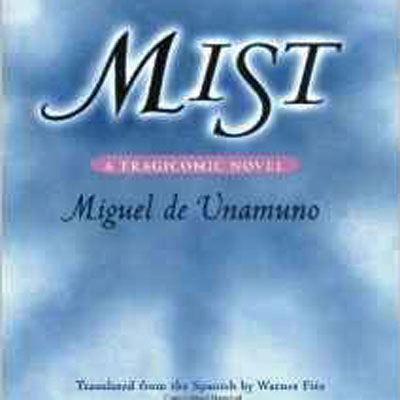
How well I know the mix of emotions Augusto feels. Reading this amusing little novel pushed me further into the abyss. I might be a computer simulation where the simulation takes the form of a fictional character. I must remember to be kind to authors.
The Russian author Andrei Sinyavsky (Abram Tertz) introduced me to yet another iteration of this simulation theme in his famous short story Icy Conditions (The Icicle).
They say that the human embryo goes through various stages. First, it’s a fish, then apparently an amphibian, and after that it gradually grows into something like an ape. What do you make of that?! So fish, and even frogs, were once given some chance of jumping around and showing off their paces in my body. Only I can see that our old teacher didn’t get around to telling me that these are not just abstract stages that my organism went through while it was an imbecile embryo gradually forming in my mother’s womb. In those golden days I was twin and partner, as it were, to some quite specific living carp which had perhaps swum in the river Amazon eighteen million years ago. And all other fish, every one of them, found a home in my contemporaries …
We shall settle inside some roomy citizen of the future and I think that he will not be indifferent to us. He will be a polite man of tact and advanced views, and the science of these progressive times to come will have told him the whole story. And so, as he sits by his window on a quiet summer evening, he will suddenly feel a restless stirring inside his soul.
His breast will suddenly brim over with certain emotions and fantastic ideas will come into his tired head. At first he will be surprised and uneasy, but then he will remember about migrant souls and say, “Ah, it’s you, old pal! I know who you are. How are things? Greetings to Clovis and Leonardo da Vinci!”
Hey! You there, man of the future! Listen to what I say! Don’t forget to remember me on that quiet summer evening. Look, I’m smiling at you, I’m smiling in you, I’m smiling through you. How can I be dead if I breathe in every quiver of your hand?
Here I am! You think I don’t exist? You think I’ve disappeared forever? Wait! The dead are singing in your body; dead souls are droning in your nerves. Just listen! It’s like bees buzzing in a hive or the hum of telegraph wires carrying news around the world. We were people too; we also laughed and cried. So look back at us!
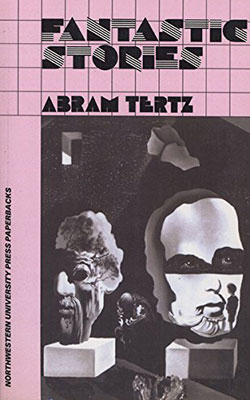
I’m beginning to think like my two grandchildren behave. “You are a simulation!” “Am not.” “Are too.” “Am not.” Philosopher Jim Holt explores the simulation theory in great detail in Chapter 10 of his excellent book Why Does The World Exist: An Existential Detective Story. His conclusion, succinct and to the point, is to quote from Ambrose Bierce’s The Devil’s Dictionary. Ambrose Bierce is writer/reporter who is still lost in Mexico.
So does reality ultimately consist of mind-stuff? Is it no more (or no less) than an enormous, infinitely convoluted thought, or even dream? Seeking additional authority for this rather wild-sounding conclusion, I turned to what had hitherto proved an unimpeachable source: The Devil’s Dictionary. There I found the following apt definition: “Reality: N. The dream of a mad philosopher.”
I dream or my dreams dream me. Either way, I’m okay with it. Should these peculiar speculations reach the simulator of my simulations, I have only one thing to say whomever or whatever it is. DO THAT ONE MORE TIME.
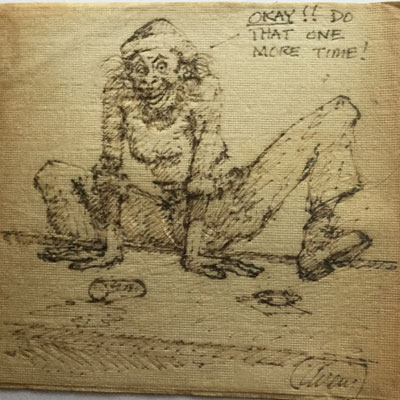
Sea Gull Cellar Bar, Napkin Art, Bob Avery artist

